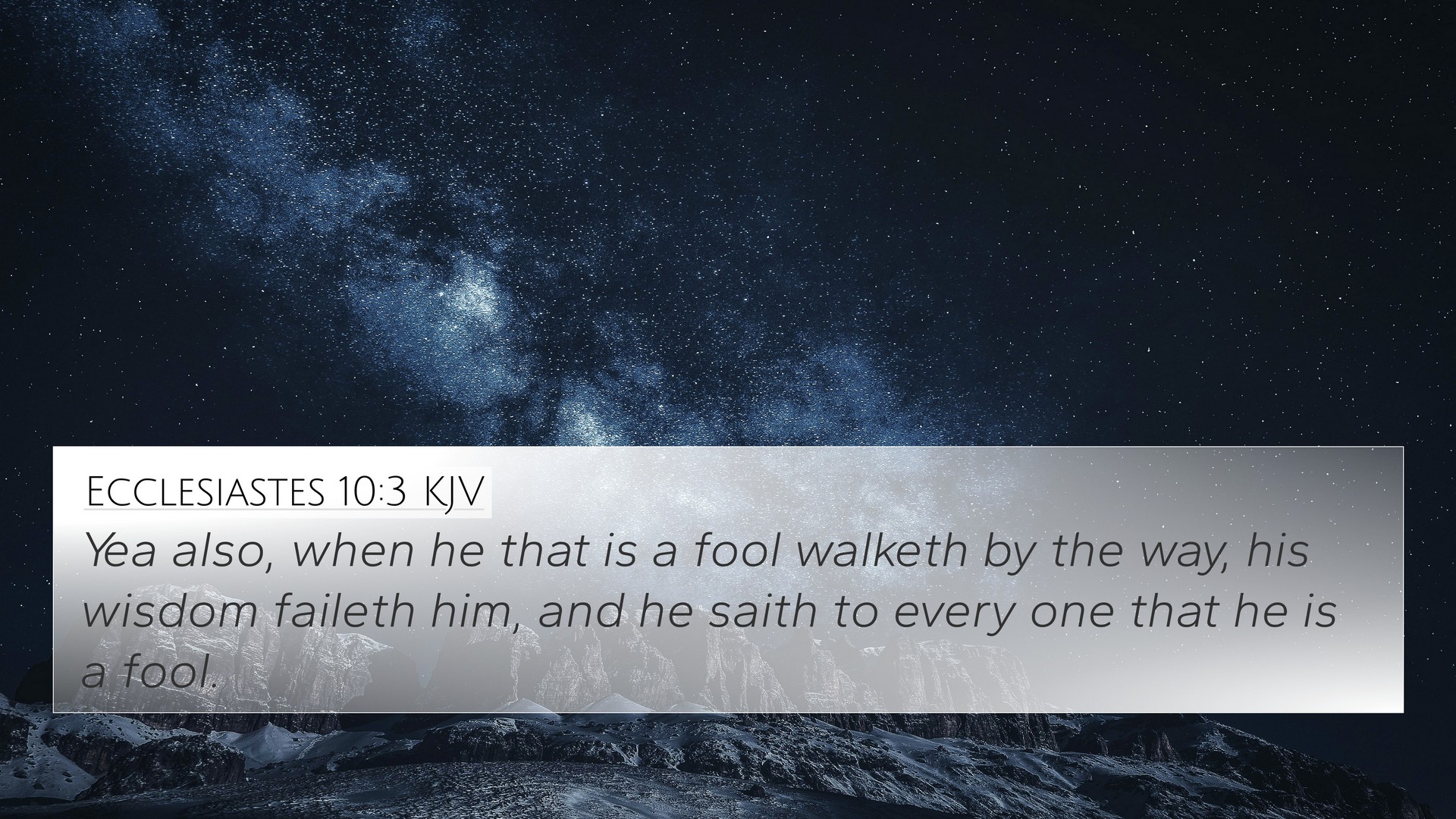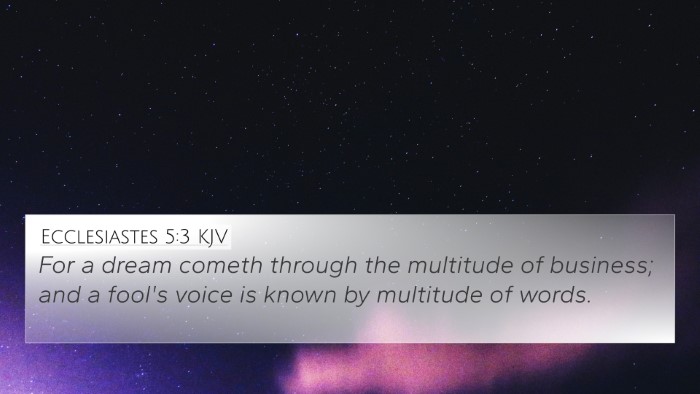Understanding Ecclesiastes 10:3
Ecclesiastes 10:3 states: "And yea, also, when he that is a fool walketh by the way, his wisdom faileth him, and he saith to every one that he is a fool." This verse highlights the folly inherent in one who lacks true wisdom, even in their actions and speech.
Context and Overview
The Book of Ecclesiastes presents reflections on the nature of life, offering philosophical insights that echo throughout the ages. The new observations in this particular verse revolve around the relationship between foolishness and public perception.
Commentary Insights
- Matthew Henry: He emphasizes that a fool reveals his ignorance through careless behavior. The act of walking the streets obliviously communicative of one's lack of wisdom is lamentable. Henry notes that this foolishness can be both self-destructive and publicly visible, calling attention to the need for prudence and understanding.
- Albert Barnes: Barnes focuses on the idea that a fool, when traversing life, exposes his foolishness not only in his words but also in his actions. He explains that the inconsistency of life and the foolish claims made can lead to not only personal folly but also bring ridicule from onlookers, thus impacting one's reputation significantly.
- Adam Clarke: Clarke elaborates on the public implications of this verse, suggesting that foolishness doesn’t just affect the fool personally but has social ramifications. This verse serves as a warning of the public consequences that accompany impudent behavior, alerting believers to the wisdom of maintaining a careful demeanor.
Key Themes
- The folly in speech and action: The verse depicts a fool who, despite their lack of wisdom, is oblivious to their own shortcomings.
- Public perception of foolishness: A fool's behavior invites judgment and exposes oneself to societal ridicule.
- The contrast of wisdom vs. folly: True wisdom should lead individuals to avoid foolish actions that could reveal their ignorance.
Bible Verse Cross-References
- Proverbs 18:2: "A fool hath no delight in understanding, but that his heart may discover itself." (Shows the connection between a fool's nature and lack of understanding.)
- Proverbs 12:15: "The way of a fool is right in his own eyes: but he that hearkeneth unto counsel is wise." (Illustrates the danger of self-deception among fools.)
- Proverbs 13:20: "He that walketh with wise men shall be wise: but a companion of fools shall be destroyed." (Emphasizes the impact of surrounding oneself with wisdom versus folly.)
- Ecclesiastes 7:4: "The heart of the wise is in the house of mourning; but the heart of fools is in the house of mirth." (Highlights the dichotomy of thought between wise and foolish individuals.)
- Proverbs 14:7: "Go from the presence of a foolish man, when thou perceivest not in him the lips of knowledge." (Warns against associating with fools since it fosters ignorance.)
- Proverbs 29:11: "A fool uttereth all his mind: but a wise man keepeth it in till afterwards." (Examines the tendency of fools to speak carelessly compared to the wisdom of discretion.)
- Psalm 14:1: "The fool hath said in his heart, There is no God." (Connects the concept of folly with a rejection of divine wisdom.)
- Matthew 7:26: "And everyone that heareth these sayings of mine, and doeth them not, shall be likened unto a foolish man, which built his house upon the sand:" (Refers to the consequences of foolishness linked to disobedience.)
Thematic Connections and Analysis
Linking the themes from Ecclesiastes 10:3 with other pieces of scripture reveals a panoramic view of wisdom versus folly throughout the Bible. The comparative Bible verse analysis provides insight into common themes held in various contexts of scripture, reinforcing the character of God and the calls to wisdom.
Throughout the Bible, connecting fragments reveal that understanding one's folly leads to wisdom. For instance, Proverbs often addresses the pitfalls of foolishness in relation to one’s actions and decisions. Each verse highlights the overarching theme of discernment that Christians are encouraged to pursue.
Tools for Bible Cross-Referencing
Utilizing tools like a Bible concordance or a Bible cross-reference guide can provide significant insights into how verses relate to one another. Understanding this interplay enriches study and application, guiding individual interpretation and lesson preparation.
Conclusion
In summary, Ecclesiastes 10:3 serves as a profound reminder of the importance of wisdom in both personal and social contexts. The connections made within the Scriptures collectively advocate for the value of wisdom as a trait to be prioritized. It encourages believers to strive towards understanding through careful actions and discourse, reminding all that the road to wisdom requires conscious effort and self-awareness.







